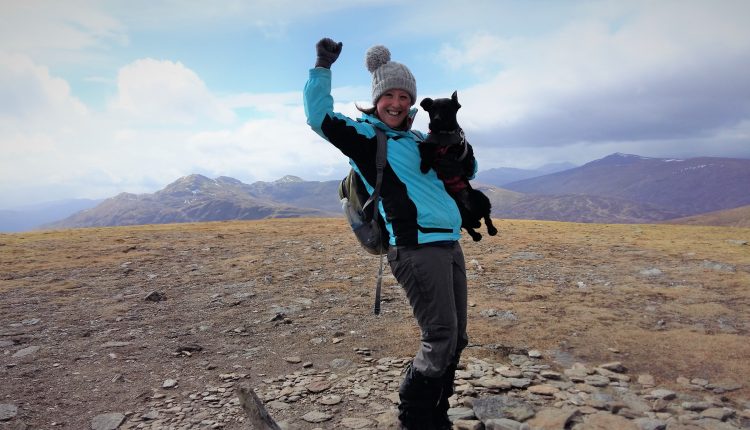I’m standing at the start of the Edinburgh Marathon at 9.30am on a very chilly (8 degrees!) Sunday morning in May, feeling extremely out of my comfort zone. It has been a long journey to get here – both physically and mentally – but in some ways I don’t actually know how I got here. I’m not even sure I should be here – I feel like a bit of a fraud, trying to be something I’m not. Trying to fit in. Who am I to think I can run a marathon?
I’m incredibly nervous. I feel sick. I feel like the nerves are about to explode out of me – I’m hoping not in the form of vomit. I fidget. I feel doubt. I feel worried. I can’t keep my mind or my body still. I feel anxiety and nerves on a totally different level than I’ve felt before…
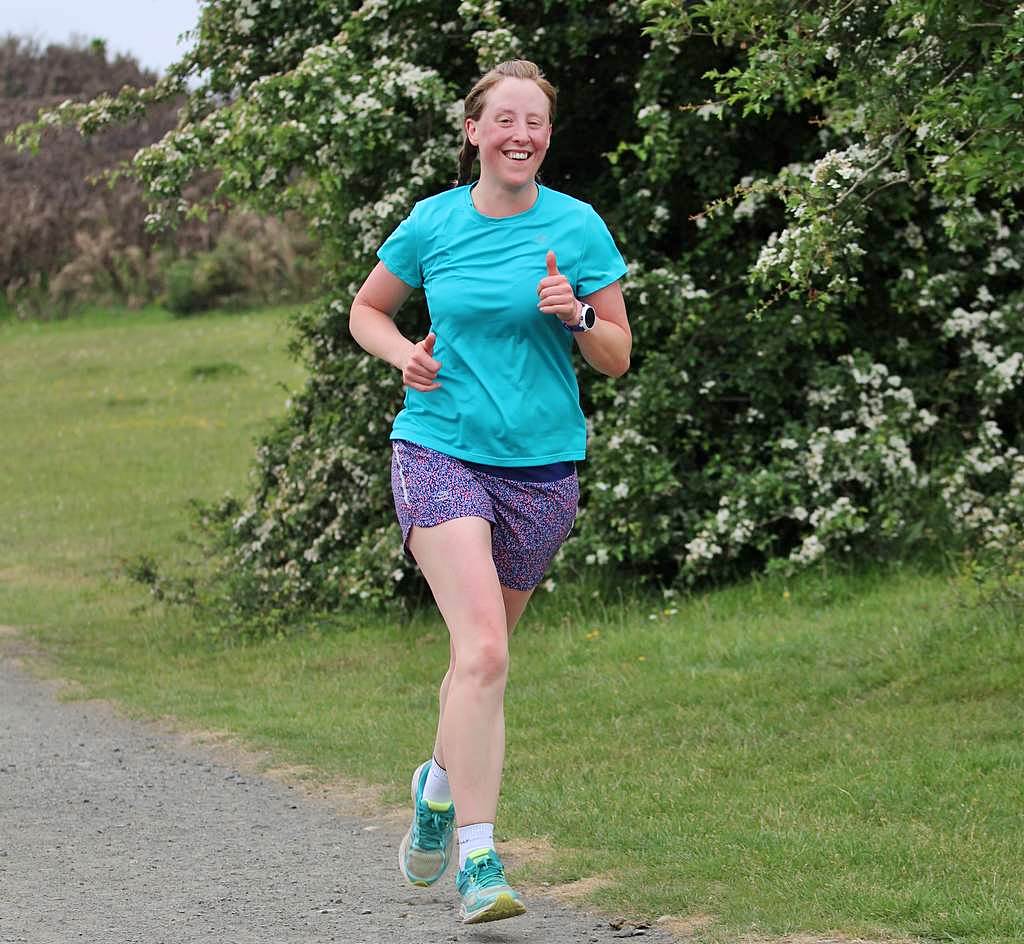 And that’s when it hits me. I know these feelings. These feelings are a great comfort to me – they’re what I know. I feel them on most days – perhaps not to this extent, that’s fair to say, but these feelings are not unknown to me. Perhaps this is my comfort zone after all?
And that’s when it hits me. I know these feelings. These feelings are a great comfort to me – they’re what I know. I feel them on most days – perhaps not to this extent, that’s fair to say, but these feelings are not unknown to me. Perhaps this is my comfort zone after all?
Most days I feel like a bit of a fraud; that I’ll get ‘caught out’ eventually. Most days I feel nerves, anxiety, stress and worry. These feelings are my comfort zone. I may not be physically in my comfort zone – shivering away on the Edinburgh University campus about to run a marathon for the first time – but mentally these are feelings I know and feelings I deal with all the time. And that realisation gives me strength. Okay maybe I can do this – I’ve done so many things on the edge of my nerves so why should today be any different?
I got through school, with all its tough times of trying to be something I wasn’t just to fit in and have friends, only to be written notes (the days before social media, thankfully!) saying I wasn’t good enough, I wasn’t cool enough, I wasn’t fun enough, I’d never be part of this ‘in crowd’. I kept this mentality all through school and took it to university with me – to these very buildings I’m about to start a marathon at in fact – ‘I’m not good enough and I’ll never fit in’. I made friends but I didn’t keep many. I know how to push people away before they inevitably do the same to me.
On my way home from a three day tour to Skye, I burst into tears and couldn’t stop. I knew I couldn’t keep the facade up any longer
I managed to cope with a year of study abroad in America for my third year – moving continent on my own without knowing anyone was extremely daunting but it did give me a fresh start, a chance to start again. I left a damaging relationship (one I had tried to leave a long time before but had been threatened by my ex that his subsequent suicide would be on my hands; thankfully this didn’t come to fruition but it left me mentally frazzled for far too long), and left behind – for now – the entrenched feelings of being inadequate, not good enough, a failure, a fool. I came back a less damaged person, a slightly more confident person, with a small support network in North Carolina who still ‘get’ me, even 12 years later.
Old habits die hard though, and I lived on the edge of my nerves as I completed university and entered the world of work. I didn’t take the most conventional path – I passed my minibus test aged 22 and became a tour driver guide, transporting visitors from all over the world around Scotland, on day tours and overnight tours. I worried constantly that I wasn’t up to scratch as a tour guide – my colleagues were all so knowledgeable whereas I seemed to get through every tour by the skin of my teeth, constantly feeling like I’d got away with it. Constantly feeling like the stories I told and the answers I gave were just enough but I could’ve – and should’ve – done better. I worried about what my passengers thought of me, that they weren’t confident about my driving ability, let alone my knowledge of my country. I got a few sexist comments along the way; one of the most memorable was a lady proclaiming that she didn’t want to go with me but would rather go with my kilted male colleague instead – the fact his tour was going to an entirely different part of Scotland was an irrelevant detail. This all served to dent my confidence even further and left me feeling even more inferior and inadequate.
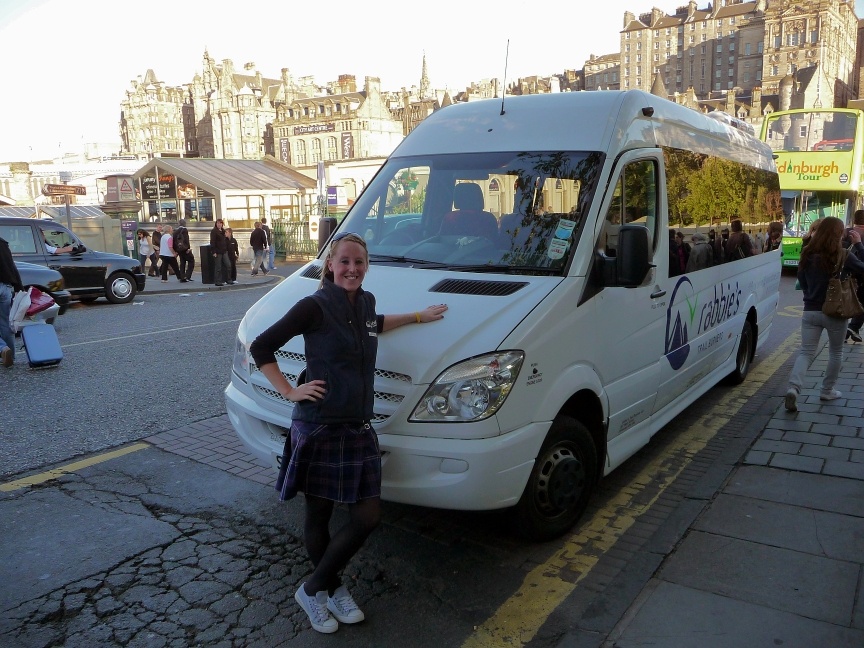 I finished every tour in a near hyper state of nerves, energy and adrenaline. I often couldn’t get to sleep for hours after a tour as I obsessed over every detail of what I could’ve done better. My inner critic had a wonderful few years throwing mud at me from every corner of my brain over how I’d let my visitors down. The first thing I did when I woke up the day after a tour was to check Tripadvisor and the company website for the inevitable bad reviews. They never came, but the positive ones were dismissed as down to luck alone.
I finished every tour in a near hyper state of nerves, energy and adrenaline. I often couldn’t get to sleep for hours after a tour as I obsessed over every detail of what I could’ve done better. My inner critic had a wonderful few years throwing mud at me from every corner of my brain over how I’d let my visitors down. The first thing I did when I woke up the day after a tour was to check Tripadvisor and the company website for the inevitable bad reviews. They never came, but the positive ones were dismissed as down to luck alone.
During my third season the pressure of expectation finally broke me. The stress of taking care of these visitors – showing them the best of Scotland; entertaining them and imparting my knowledge to them; delivering them to visitor attractions, beauty spots, accommodation and food spots, along with concentrating on driving and taking care of the vehicle – all got too much, and on the shores of Loch Ness, on my way home from a three day tour to Skye, I burst into tears and couldn’t stop. I knew I couldn’t keep the facade up any longer – I knew my days of ‘getting away with it’ were well and truly over. I somehow got that tour back to Edinburgh then got signed off work with stress.
That was when I realised I needed support. I had spent so many years convinced that the way I thought was the way everyone thought – they were all just ‘better’ at it than me. I was the ultimate people-pleaser and never wanted to cause a fuss or rock the boat. I suppressed so many true feelings and had so many unresolved issues rattling around my head – I didn’t realise until this moment that these were causing me harm. I didn’t realise I was struggling with anxiety and low self-esteem. I thought I just wasn’t a very good person and I deserved the struggle that came my way.
It took that time off work, along with the support of my then partner (now husband), to realise that my thought patterns were causing me harm, and that it didn’t have to be that way. I didn’t have to keep myself trapped in this prison of fear and self-loathing.
The newly acquired ‘label’ of anxiety was the explanation I needed for years and years of worrying, over-thinking, and feeling incredibly low about myself. It gave me a chance to do something about it – to rest, recoup, read, talk (counselling was incredibly useful to me at this time), bake, exercise, and – most importantly – to write. I started a blog about dealing with my anxiety. I set myself a physical challenge – climbing Scotland’s 282 highest mountains, Munros – to give myself something to focus on.
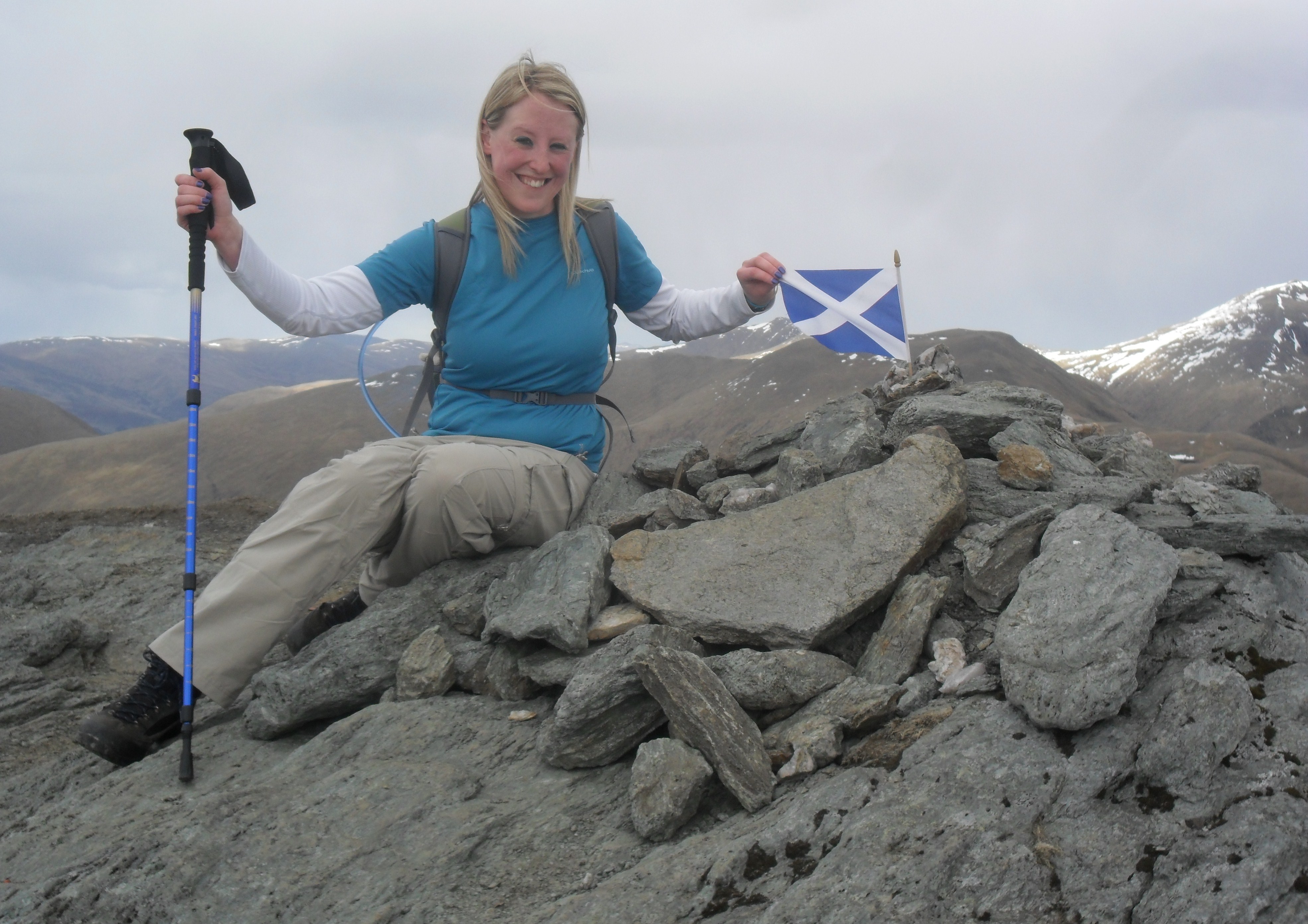 I’ve learned a lot about myself through the process of writing, and bagging Munros. I’ve ‘only’ bagged thirty-six Munros which doesn’t sound like great progress in nearly seven years, however each one has been memorable and an important part of my personal growth. This is especially true when it comes to my individual endeavours. The anxiety I feel before setting out on a Munro adventure is almost overwhelming. I obsess and worry over the tiniest details, including the drive to the start, the parking options, what if it goes wrong, what if I get lost, what if I hurt myself, what if something happens to my dog, what if, what if, what if…
I’ve learned a lot about myself through the process of writing, and bagging Munros. I’ve ‘only’ bagged thirty-six Munros which doesn’t sound like great progress in nearly seven years, however each one has been memorable and an important part of my personal growth. This is especially true when it comes to my individual endeavours. The anxiety I feel before setting out on a Munro adventure is almost overwhelming. I obsess and worry over the tiniest details, including the drive to the start, the parking options, what if it goes wrong, what if I get lost, what if I hurt myself, what if something happens to my dog, what if, what if, what if…
It’s a miracle I actually make it out the door in the morning! Each mountain conquered chips away a tiny little bit of this lack of confidence. Standing on the summit of a Munro, especially on my own, makes me feel invincible, empowered, free, and confident. The natural highs that come from outdoor pursuits are incredible. Being surrounded by nature – and often I’ve had the hills pretty much entirely to myself, especially mid-week – can make you feel so tiny and insignificant, which is the perfect antidote to being inside my own head, over-analysing and over-thinking everything.
It’s been over a year now since my last Munro. This is due to a number of factors, and I know I’ll get back to the hills soon. I’ve never put any time pressure on myself to climb them all – occasionally I’ll set myself yearly targets; in 2017 I wanted to get to 50 Munros for example – but I don’t stress if this doesn’t happen. Life can get in the way. The hills will always be there, so for me it comes down to picking the right day and the right mindset.
Running, on the other hand, has given me a more instant measure of progress. I don’t just mean in terms of time, although of course it’s wonderful to get a PB. Each run, whether it’s long or short, hilly or flat, hard or…less hard, gives me such a sense of achievement and accomplishment afterwards that I feel a grow a little bit more confident, a little bit more self-assured and little bit happier each time.
Running a marathon is an incredibly daunting pursuit that requires just as much mental strength as physical. This was a challenge unlike any other for me. It brought an incredible amount of anxiety to me – again sometimes just getting out the front door to go for a run was a real struggle, and I became an expert procrastinator. Most runs were spent with a fairly negative mindset – I often told myself I couldn’t do it. I gave myself over nine months to train, building up gradually from running parkrun every Saturday to starting a 30-week training plan that took me to the 27th of May. I doubted myself at every turn – hard runs made me question what I was thinking, trying to go from non-runner to marathon runner.
When I started to run I felt good and I felt strong. I took in the cheers of the supporters, the encouragement and the high fives. I smiled for as much of the marathon as I could
It wasn’t easy and I didn’t always manage the proposed weekly mileage. I didn’t generally feel confident about my marathon attempt but I always kept in mind why I was doing it. My eldest brother was diagnosed with a rare (one in a million) auto-immune condition last summer and was bedridden for the most part, nil-by-mouth for over nine months and fed through a stomach tube. Life just turned entirely on its head for him and our family. Just a few years prior, he’d completed one of the toughest marathons in the UK, the Cape Wrath Challenge in the north west of Scotland. He believes that anyone can run a marathon – it’s mind over matter. Yes of course you have to do the training, but it’s mental strength that gets you to the finish line at the end of 26.2 miles. I tried to keep this in mind throughout my training and marathon attempt and kept putting one foot in front of the other, chipping away slowly at the negativity and self-doubt that was my oldest enemy.
The realisation on the start line that I could turn this energy (which was manifesting itself as negative energy) into something positive gave me strength. When I started to run, crossing the start line and taking in Edinburgh’s magnificent old town, I felt good and I felt strong. I took in the cheers of the supporters, the encouragement and the high fives, the noise and the atmosphere. I smiled for as much of the marathon as I could – and I genuinely had a good time. Yes of course it was difficult; the last six miles in particular were a true test of my mental and physical abilities. But in contrast to my negative attitude during my training runs, I stayed positive and told myself to keep putting one foot in front of the other and I’d get to the finish line.
The feeling as I ran down that finishing straight and across the line was something I’d never experienced before. It was full of emotion, adrenaline and a huge sense of achievement. I felt on top of the world! I thought I’d cross the finish line saying ‘never again’, but in fact I was so elated I knew I’d want to experience that all over again – but not immediately!
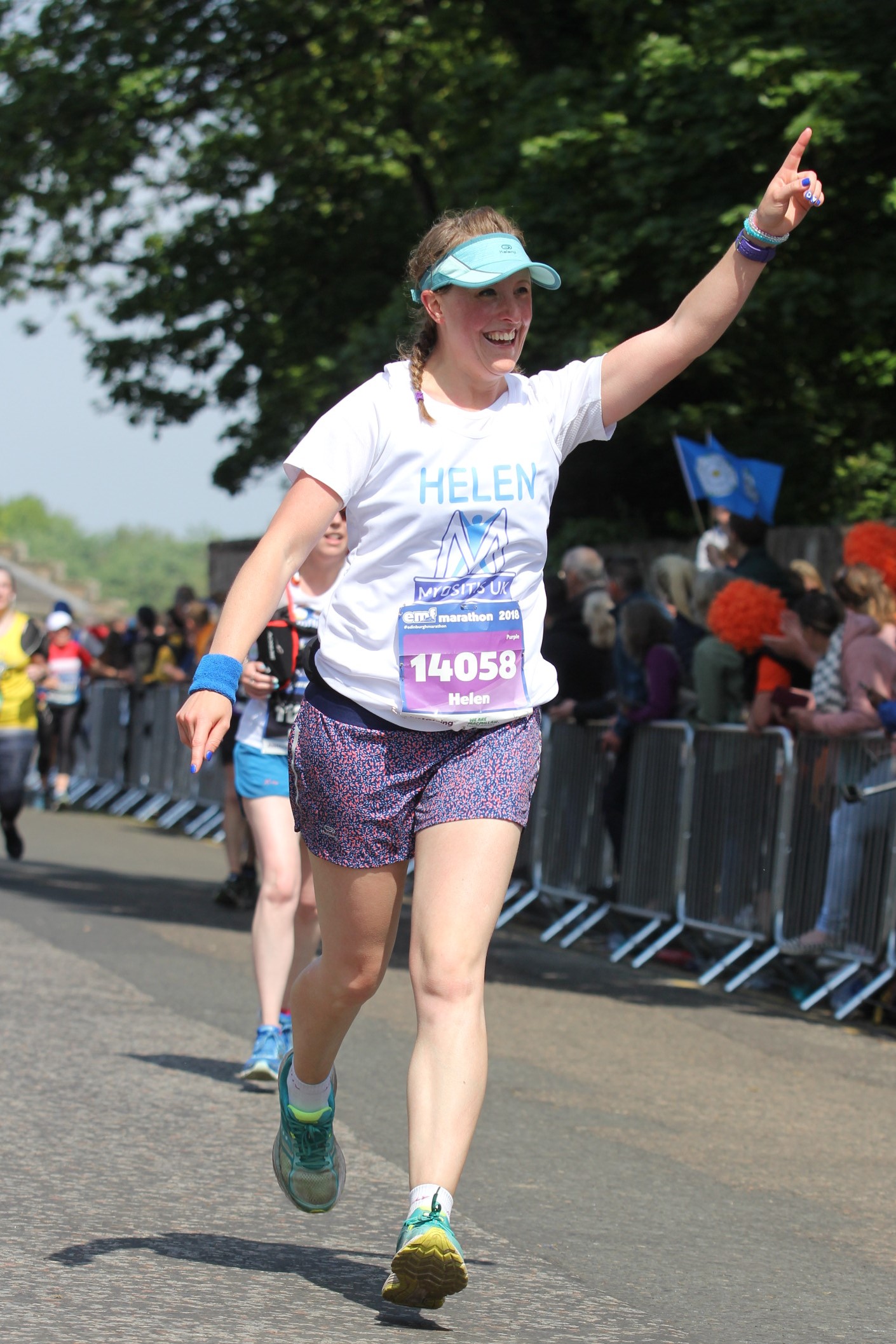 My anxiety comes with me wherever I go, and some days are worse than others. However I’ve noticed a tiny change in myself ever since completing my first marathon. Even at my lowest points, where I feel all is bleak and there is nothing to feel good about, there’s now a quiet wee voice that pops up to say “I am a marathoner”. No matter what comes next in life, I’ll always be able to say I’ve achieved this huge milestone.
My anxiety comes with me wherever I go, and some days are worse than others. However I’ve noticed a tiny change in myself ever since completing my first marathon. Even at my lowest points, where I feel all is bleak and there is nothing to feel good about, there’s now a quiet wee voice that pops up to say “I am a marathoner”. No matter what comes next in life, I’ll always be able to say I’ve achieved this huge milestone.
I now have a photo in my hall, somewhere on eye level so I see it every day when I come downstairs, of me finishing the Edinburgh Marathon. Sometimes I look at it and don’t recognise myself – ‘she looks like a strong, confident runner who knows what she is doing’ I think. But then I realise THAT IS ME. I am not defined by my anxiety or my perceived inadequacies. I am not an athlete. I am just a ‘normal’ person with good days and bad days. Running has been – and continues to be – a journey of discovery for me. A coping mechanism. A stress reliever. A health booster. It has pushed me out of my comfort zone and I can’t wait to see where it takes me next!

